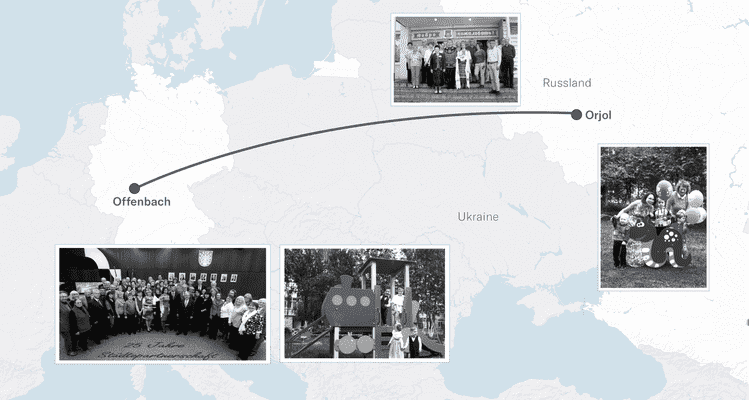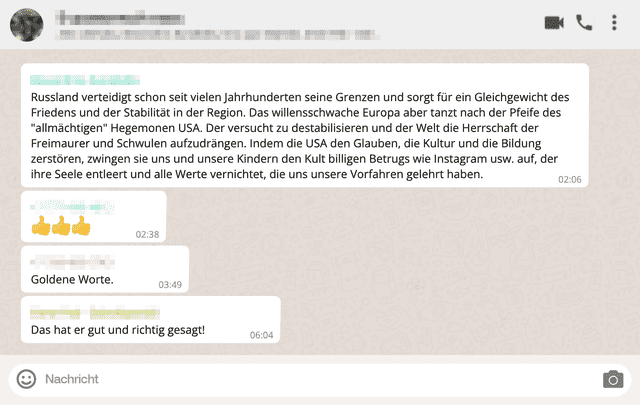There are almost 100 German-Russian town twinnings, and every third German municipality has now officially frozen them. The core question is: Is it really just Putin’s war?
Offenbach doesn’t want to let the contact rest – but many other German cities do.
The war in Ukraine is also a test for German-Russian town twinning. There are 98 official collaborations, most of which emerged in the late 1980s and early 1990s.
The partnership between the two port cities of Hamburg and Saint Petersburg, at that time still Leningrad, is the oldest – and a historical special case: on March 27, 1957, in the middle of the Cold War and against the declared will of the Adenauer government, the CDU-led Hamburger received Senate the Soviet ambassador; The red flag with hammer and sickle waved over the entrance to the town hall.
At the last anniversary of the partnership, today’s Chancellor Olaf Scholz, still mayor of Hamburg, met his counterpart in St. Petersburg. Now the celebration of the 65th anniversary is probably canceled due to the war. However, the Hanseatic city does not want to freeze its relations with Saint Petersburg.
Unlike the spa town of Baden-Baden, which has been a dream destination for wealthy Russians from Saint Petersburg and Moscow for almost 200 years. On March 28, the Baden-Baden municipal council decided to indefinitely cut the connection to the Russian twin city of Sochi. And Baden-Baden is not alone in this.
According to a NZZ survey, a total of 25 cities and districts have frozen their partnerships, more frequently in the old federal states than in the new ones – including Cologne, Düsseldorf, Aachen and Karlsruhe. Some communities link such a step to the “further developments” or still vote on it, for example Mühlhausen and Villingen-Schwenningen. However, none of the 77 survey participants wants to end the partnership in principle.
A city that does not want to let the contact rest, and has even confirmed it, is Offenbach am Main. One builds on dialogue instead of confrontation, says the chairman of the partnership association, Werner Frei.
In addition to Herne and Offenbach, 50 other cities and districts have decided against letting the partnership rest, for example Berlin, Essen, Stuttgart and Dresden. Their argument: It’s Putin’s war, not Russia’s.
Individual communities, including the city of Speyer, also state that they want to exert a “peace-building” influence on the local people. Werner Frei from Offenbach, for example, reports on a professor who asked her students at the University of Orjol not to get their information exclusively from the domestic press.
According to polls, the majority supports Putin
Taking a public stand against the war, however, is risky in Russia. It is therefore difficult to quantify how large the proportion of Russians critical of the government actually is.
Only a few polling institutes are still working independently in Russia, including the Levada Center in Moscow. In 2016, the Russian Ministry of Justice classified it as a “foreign agent”. The Center’s most recent representative poll shows 83 percent approval of Putin’s policies. Before the invasion of Ukraine, it was 70 percent.
In any case, the figures are not implausible. The fact that the population often rally behind the government in times of war and crisis, at least for a short time, is a phenomenon that can also be observed in other countries («Rally ’round the flag» effect).
Natalie Rudi therefore drew consequences, including very personal ones. Rudi lives in Hanau in Hesse and takes care of relations with the Russian sister city of Yaroslavl in the local partnership association. She herself comes from the former Soviet Republic of Kazakhstan and came to Germany in the 1990s.
In addition to Hanau, Kassel also has a partnership with the city. Both German cities have now officially frozen contact – “indefinitely, until the war is over,” says Rudi.
In contrast to Gütersloh or Mühlhausen, however, Hanau has refrained from demanding a public statement from the Russian partner. “We don’t want to endanger people with moral appeals,” says Rudi.
The Kulturkampf is raging in private chats
Even in private, Rudi quickly noticed that she rarely got through with it – this is documented by the chat history of a Russian-speaking Whatsapp group of which Natalie Rudi was a member. At first she tried to influence her friends with long texts, to describe her view of the war of aggression. “But at some point the dam broke.”
“They lived and ate with us – they were our friends,” says Rudi. That’s why she broke off contact with some of them completely after decades of friendship.
In the meantime, her association is mainly involved in the Ukrainian refugee aid, organizes fundraisers and places refugees with Hanau families – new friendships develop, elsewhere even new town twinnings: At the beginning of April, for example, the city of Mannheim decided to officially cooperate with the Ukrainian community of Czernowitz.
The friendship between Hanau and Yaroslavl, on the other hand, will not return to its old form any time soon after the war, Rudi believes. She sees post-war Russia facing a similarly difficult task as Germany did in 1945. “People first have to realize that something terrible has happened. And that can take time.”

